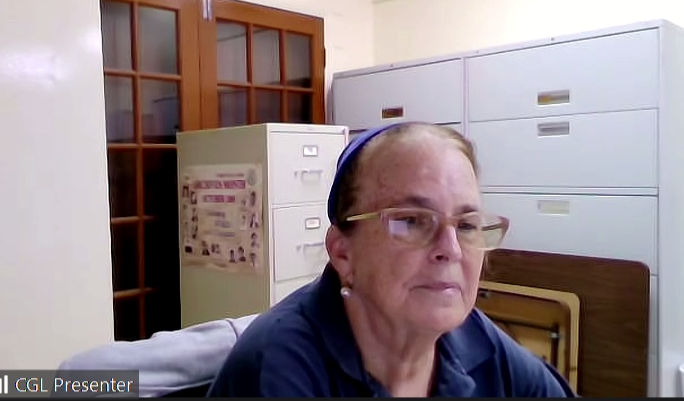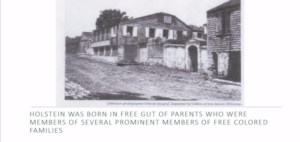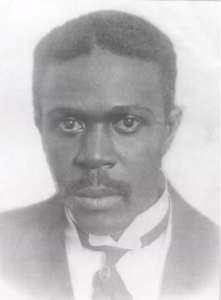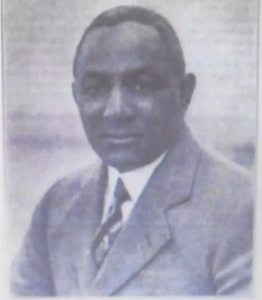
On Sunday, the Caribbean Genealogy Library hosted another virtual event, this time focusing on the efforts and accomplishments of two prominent Virgin Islands men in the 1920s, Casper Holstein and David Hamilton Jackson, who led charges for citizenship, voting rights, and political reform for Virgin Islanders.
Presenter Elizabeth Rezende spoke passionately about Holstein and Jackson in her presentation “David H. Jackson and Casper Holstein: Early Collaboration in Fighting for Political Reform 1921-1927.” She described both men as being poetic and of model leadership. Her presentation answered the question, why did the middle-class men feel the need to uplift the lower classes and work so diligently in providing for their social, economic and political needs?
Both Holstein and Jackson were born on St. Croix, Holstein in Free Gut and Jackson in Estate East Hill. According to Rezende, Holstein left the island at the age of nine in 1886 with his mother where he attended school in Brooklyn. To Rezende’s record, both men would have met in New York in 1915 while Jackson was in transit from New York to Copenhagen to get a license for his newspaper.

“They were brothers-in-law,” said Rezende. She acknowledged that for Holstein, a lot of emphasis is often focused on his horse bets, setting up his numbers game, and his mysterious kidnapping disappearance, but he, along with Jackson, were both determined “to make the Virgin Islands a better place socially, economically and politically.”
After serving the United States during the First World War, Holstein enlisted in the Navy and was able to dock into Sub Base on St. Thomas while serving. While there, he spoke to locals about the living conditions present (potholed roads, derelict housing, lack of sewage system, lack of employment opportunities, the high cost of imported goods, and oppressive Marine soldiers). He saw a need to make better living conditions for Virgin Islanders.

For Jackson, his push for the working class came through his writing. He joined an organization by David Canegata, a colonial council member on St. Croix, for young men who were descendants of the free colored class who wanted to get a formal education in science, psychology, and philosophy when high school was not available in the Caribbean. During this time, Jackson would write articles and submit them to the local newspaper. However, one article he wrote was rejected because it was viewed as too political in its socialist views. This rejection pushed Jackson to create his own newspaper and he would end up procuring a license for The Herald, a newspaper that informed the public on social matters, trade unions, and working conditions.
“He thought that could be a way of changing St. Croix society or Virgin Islands society,” Rezende of The Herald said.
Focusing more on the middle years of Holstein and Jackson and the collaboration between the two men, Rezende highlighted that both would lead strikes, create political reform, and look for economic ways to better the lives of Virgin Islanders. For example, in January 1916, while leading the St. Croix Labor Union, Jackson called a strike to demand wage increases from 20 cents to 50 cents. And later, after studying law in Indiana, he led another strike for wage increases to 75 cents. He even helped establish the St. Thomas Labor Union with James Moorehead.

Holstein would also fight back against unfair legal systems and a need for judicial and civil liberties. He bought Estates Hope, Jerusalem and Blessing from the St. Croix Labor Union, which used it for provision production, and decided to use it for dairy production and homesteading. Holstein even brought Congressional council members from New York to recruit members to be a part of a Congressional Congress on St. Thomas and St. Croix to write bills to Congress and fight for wage increases and better housing.
Describing the men, to Rezende’s account, Holstein had a more “calm and measured tone,” had a flair in his actions and words, and had the financial backing to create developmental investments while Jackson was more a “fiery minster seeking to stir up passion in his listeners,” would invest union funds to expand offerings to lower class people, and would be “headstrong.”
According to Rezende, in the 1920s there was a migration of thousands of Virgin Islanders to the mainland, more particularly New York, for a better quality of life due to the decline of the sugar and rum industries after federal prohibition. During that time, both men would petition Congress for citizenship and an end to marine rule, for appropriations for education, for universal suffrage for men, and for a permanent civil government in the territory.
They “were focused on a fight for the many aspects of self-determination for both the New York VI diaspora and the residents of the Virgin Islands,” said Rezende. “Both men wanted to see greater civil and political rights for both groups of Virgin Islanders.”
In all, Rezende gave an account of some of the contributions made by Holstein and Jackson to the strides in social and economic progress of the Virgin Islands.
CGL’s next event, “Ten Steps to Writing & Publishing Your Family History” is April 27 at 2 p.m.
For more information about the Genealogy Library, click visit the official webisite.





